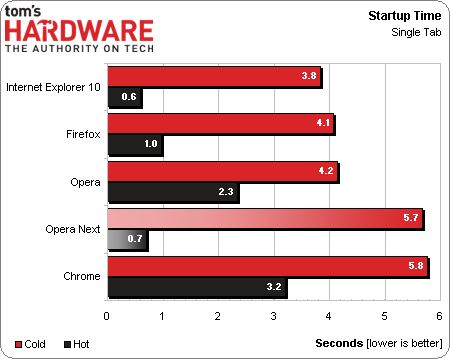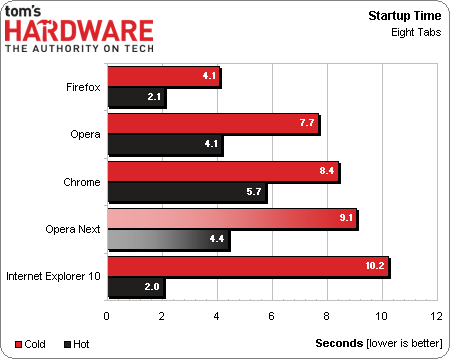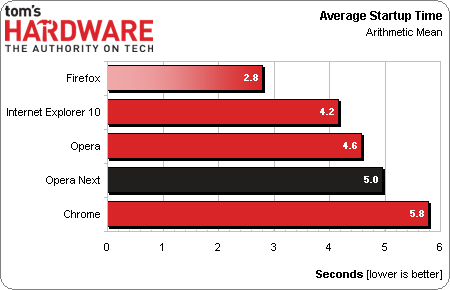Chrome 27, Firefox 22, IE10, And Opera Next, Benchmarked
Today, we have the latest benchmark results from the top four Windows-based Web browsers, along with a sneak peek at Opera's upcoming Chromium-based overhaul. Is this really a step-up from Presto/Carakan or just another Chrome clone?
Wait Times: Start-Up
Why you can trust Tom's Hardware
All start-up times are recorded using a stopwatch, and timing begins from the point the application is launched to the point that all tabs report fully-loaded content. The single-tab test page is a saved copy of the Google SERP for "Tom's Hardware", hosted from our local Web server. The eight-tab tests add the About page on barbeque beef brisket, a product page from Amazon, a random popular question on Ask, the "free stuff" listing for Los Angeles on craigslist, my LinkedIn profile, the Wikipedia page for Tom's Hardware, and the Yahoo! homepage. As with the Google SERP, all pages are saved and hosted from our local Web server.
We've combined the hot (newly-opened) and cold (re-opened) browser times into one chart each for single- and eight-tab starts.
With just a single homepage, Internet Explorer leads when it's launched for the first time after a fresh reboot. Firefox 22 isn't too far behind at just over four seconds. Meanwhile, the original Opera earns a close third-place finish. Opera Next and its new cousin Google Chrome take up fourth and fifth place, respectively.
When the browsers are re-opened, the placing changes to IE10, Opera Next, and Firefox rounding out the top three spots, with each browser taking just one second or less to launch. The old Opera is a distant fourth-place finisher, while Chrome takes more than three seconds to re-open, landing the planet's new favorite Web browser squarely in last place. Remember that this is gauging start-up time, so the difference between Opera Next and Chrome is probably due to a combination of Google services built into Chrome and the lack of a full feature set in Opera Next.
With a home group of eight tabs, Firefox 22 is the first-place finisher when we start it up cold, commanding a substantial lead over the second-place contender, the current version of Opera. Chrome comes in third, while Opera Next follows closely in fourth place. IE10 is the only browser to surpass the 10-second mark, placing last. Also, remember the original caveat to our start-up time testing: eight tabs is Internet Explorer's home group maximum. So, although IE10 is only about one second behind Opera Next, it also hits a limitation that the other browsers aren't confined to.
Started hot, IE10 takes the lead, opening all eight tabs in two seconds flat! Arch-rival Mozilla Firefox takes an extremely close second place. The remaining browsers fall quite a bit further behind, as the third-place finisher (Opera), takes just over four seconds. Its replacement takes nearly four and a half seconds. Meanwhile, Chrome places dead last, yet again.
Now let's see the average time it takes each browser to complete all four start-up scenarios.
Firefox commands an impressive lead at just under three seconds. That's an incredible performance, and a vast improvement over Mozilla's early rapid-release versions. IE10 places second, while the original Opera places third. Opera Next is close behind at five seconds. Chrome takes almost six seconds to start, on average. This is a terrible fall for the Web browser originally known for opening in a split second.
It seems that Opera Next is a minor downgrade from the current version, though it's not as slow as Chrome. Once again, we need to point out that this is a browser in development, so everything could very well change by the time it becomes Opera.
Current page: Wait Times: Start-Up
Prev Page Test Setup And Benchmark Suite Next Page Wait Times: Page LoadGet Tom's Hardware's best news and in-depth reviews, straight to your inbox.
-
Onus No, the Onus is not on Google; I'm using www.startpage.com for my searches.Reply
While this is interesting, I still encounter built-in pages (such as on routers or other network devices) that will not render cleanly in Firefox, but are perfect in IE. More often than not though, pages that would be filled with nuisance ads and popups are cleaned up nicely by Firefox with AdBlock+ and NoScript.
-
soundping A good test is rendering a heavy site like Huffington Post. They use a ton of flash and java scripts.Reply -
ivyanev While benchmarks are the way to compare browsers, they do not represent the feel you get- firefox might be faster but still feels sluggish compared to chrome or opera(the stable one).Reply -
pharoahhalfdead I would like to see benchmarks on page start up, and load times comparing ssd, hard drives, and ram drives. Maybe I missed these an a previous article, but I feel since ssd's and ram drives are getting more popular, benchmarks should prove or dispel the the 'so called' benefits they bring.Reply
I have both and start up times for IE are quick but page load times are horrendously slow, whereas FF has slow start up times but superfast page load times. It's possible that add-ons are contributing to that. -
mccainm Ever since I have compared Firefox and Chrome I've always found Chrome to start much faster (I'm running the Dev channel and my wife uses the Stable channel and they both take maybe 1 - 2 seconds to start cold or hot). Only IE beats both of them. Maybe Firefox 22 is that much faster and worth a try, but seeing as Chrome did so well in most categories I'll probably stick with it.Reply -
EzioAs Having move back to Firefox a couple years ago after Chrome, I don't intend to use Chrome (or any other browser) regularly anymore. I still give Chrome 2-3 tries a week (just to compare things) but Chrome isn't better than FF in 3 things:Reply
1) Pages load noticeably slower
2) Memory usage is indeed high (as seen in the benchmark above)
3) FF add-ons are much better than chrome extensions.
I never noticed any startup time difference for both FF and Chrome; it's possible they're both fast enough that it doesn't even matter at this point. I also like the FF toolbars better although that's really more of a personal preference. I've never tried maxthon though; heard it's pretty good. -
beoza I've never really noticed a difference in browsers speed wise. Sure some load pages faster than others, and some have issues with certain pages. But in the end they all take me to the same place. I use Firefox 95% of the time at home with adblock+, if I encounter an issue I clear cache, if it still has issues I switch to IE 10, usually this is all I need to do but once in a while IE has problems with a page and I just move on to something else. At work I'm stuck using IE10. The speed of a browser can also be affected by other factors like the speed of your connection, how many devices are on your network, what tasks your doing on the computer at the same time like gaming, downloading, streaming movies (netflix, hulu), and your hardware. You're not going to get much responsiveness on a 5yr old celeron w/2gb ram and Win XP while you're downloading a game, watching youtube and the A/V suite scans your computer in the background, and there's 5 other people all sharing your 10Mbps network. Which describes probably 50% of the users out there in the real world.Reply -
Someone Somewhere Opera Next (and every other browser) is a significant step down in terms of features/customization from the current version.Reply
I'll miss a hell of a lot of stuff when I move off Presto-based Opera. -
ElDani Well done on this test, I actually found the test results genuinely helpful and your summary/conclusion to be well thought out.Reply
Still, this test shows us once more, that no modern browser - I exclude Opera from this, since it isn't a maintained release anymore - must absolutely be replaced by the winner of such tests. If you don't mind performance weaknesses of the Internet Explorer in certain areas, or if your most-accessed websites don't require you to use a certain alternative, then even Microsoft's browser of choice can be okay for daily use (if only as an engine in products like Avant, Maxthon, etc).
The one thing I'm a bit curious about: why does Opera Next suddenly behave so differently from Chrome? Yes, there's a difference between Chrome 27 (WebKit) and Opera Next (Blink = Chrome 28), but if that's the only reason for the browser's weaker showing, then the future of Chrome doesn't look too good. What's your take on this? -
tomfreak I dont know how useful in this review when they are tested all the browser on a 1155 super computer, nobody is going to tell the diff if the browser is 0.25sec faster. Get some Brazos, Atom and run the test, these are the platform have problems with web browsing.Reply


